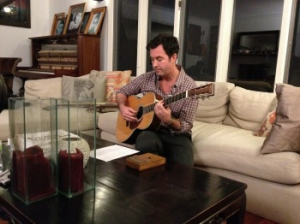Docudrama about Handel’s Messiah on BYUtv November 27, 2014
Posted on November 22, 2014 at 8:00 am
BYUtv has produced a new docudrama, Handel’s Messiah, premiering November 27, 2014, about the world’s most popular and renowned choral work by one of the leading composers of the Baroque era, George Frideric Handel. The docudrama, narrated by Emmy® and Golden Globe®-winning actress Jane Seymour, tells the little known dramatic and inspiring backstory of how the iconic oratorio came to be written. It conveys a universally powerful tale of humanity laid bare in all its brilliance and imperfections, and offers a powerful perspective on the timeless classic that has thrilled generations, especially at Christmas.
Produced and directed by filmmaker Lee Groberg, edited by cinematographer Mark Goodman and written by screenwriter Mitch Davis, the 78-minute docudrama chronicles the lives of three primary characters – composer George Frideric Handel, singer/actress Susannah Cibber and patron of the arts/librettist Charles Jennens – while capturing the drama, intrigue and suspense that surrounded their interactions.
Handel’s Messiah examines in depth the life of George Frideric Handel – a complicated, strong-willed, temperamental and creative genius who had an extraordinary ability to convey drama and human emotions through music. The docudrama follows Handel’s journey from his home in Hamburg, Germany, to Rome, Italy, where he traveled to hone his composing skills, only to be thwarted by a papal decree banning opera. Fortuitous, the decree encouraged Handel to develop oratorio, a new musical genre that blended opera and sermon, which prepared the way for his crowning work, Messiah.
Moving onto London, Handel continued to focus on producing secular Italian-language operas and became one of the first composers to successfully stage an Italian opera in London. The docudrama explores the experiences behind Handel’s Messiah and tells the story of how Handel befriended Charles Jennens, the man responsible for compiling the poetry and prose from the Old and New Testaments to help complete this musical masterpiece. The film also depicts Susannah Cibber, the opera singer who was able to breathe life into this redemptive composition.
Leading Handel musicologists, historians and religious leaders featured in the docudrama include:
Fred Fehleisen, Professor, Juilliard School of Music
Ellen T. Harris: Professor, Massachusetts Institute of Technology and internationally recognized scholar specializing in the music of Handel
Ruth Smith: leading Handel Scholar at Cambridge
John Rutter: composer and leader of the King’s College Choir at Cambridge
John H. Roberts: leading Handel authority, University of California, Berkeley
Donald Burrows: Professor of Music and Director of the “Handel Documents Project” at the Open University, England
Paul McCreesh: British Conductor and expert in early music
Katherine Hogg: Librarian at the Foundling Museum in London in charge of the Gerald Coke Handel Collection
Michael L. Ballam: Music Historian and Professor of Opera at Utah State University
Richard Egarr: Music Director, Academy of Ancient Music, Amsterdam
Elder Russell M. Nelson: Quorum of the Twelve Apostles, The Church of Jesus Christ of Latter-day Saints, Utah
Rev. Mary June Nestler: Episcopal Diocese, Salt Lake City, Utah
Father John Schiavone: Pastor of the St. Maria Goretti Catholic Church, California
“Handel’s Messiah was created amidst tragedies from financial ruin and suicide to adultery and apostasy, ” said Mr. Groberg. “Yet, through this darkness came the ultimate expression of Christian faith, hope and charity that continues to effect people today and is performed by choirs around the world like clockwork each year.”
Handel’s Messiah tells the tale of a creative genius whom Ludwig von Beethoven regarded as the greatest composer, “the master of us all,” who had the gift of being able to express and understand very complicated human emotions. Messiah reminds us that we are all fallible, yet worthy of forgiveness.
Handel’s Messiah will premiere Nov. 27th on BYUtv at 7pm MT/9pm ET and will be rebroadcast throughout the 2014 Holiday Season.

